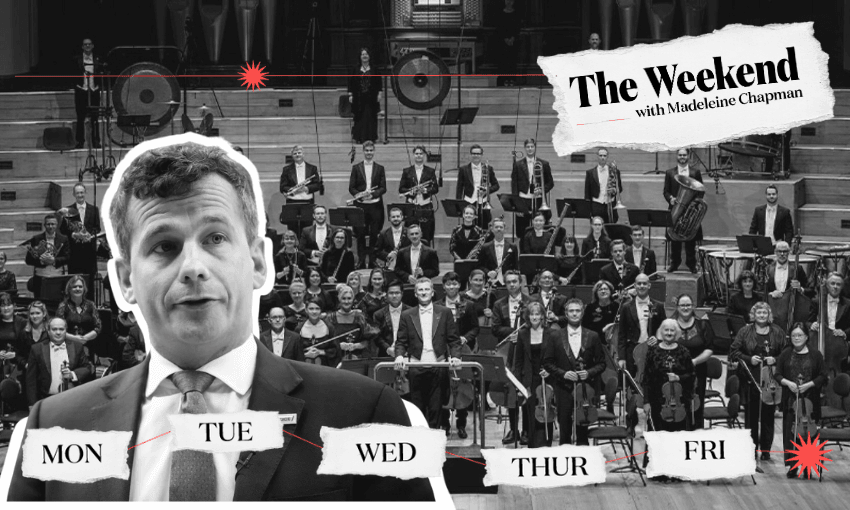Madeleine Chapman reflects on the week that was.
This week I found myself surrounded by collective action in all its forms. I watched the Auckland Philharmonia perform Hans Zimmer’s greatest hits to a packed out Aotea Centre for Art of the Score last weekend. It was incredible and rare to see such a large, diverse crowd brave a miserable wet evening for the orchestra.
Film composers like Hans Zimmer have proven to be a gateway drug for classical music. It’s the sense of safety that we all knew what we were getting and already had emotional connections to the music. The fact that it was performed live, with an orchestra – every individual providing something unique to the wall of sound – was a stunning cherry on top.
There were moments when we applauded soloists on different instruments, and technically Zimmer creates most of his scores on a computer, but what everyone wanted was the full, collective effort.
Abuzz with love for the orchestra, I went home and watched an Oscar-winning documentary on Orin O’Brien, the first female fulltime member of the New York Philharmonic who retired recently after more than 50 years as a double bassist. At one point in the film O’Brien got frustrated by her niece’s persistent comments about her legacy. “You’re trying to make me more important than I am,” she said, before explaining that the very thing she loved about being in the orchestra was the fact that she was able to do what she was best at while also being just a small part of a massive project.
On Thursday, all of parliament bar one party contributed their individual votes to an overwhelming majority deciding that the Treaty principles bill had reached its end. David Seymour spoke first, arguing the bill was still legitimate despite 90% of more than 300,000 public submissions being opposed to it.
Seymour is a loud voice in parliament and in this country, and he has proven to get a lot done purely of his own conviction. But in this instance, there was no single opponent for him to debate or challenge, it was a collective voice. And rarely does the lone wolf triumph over collective action.
Now, as I type this on a Friday morning, I’m a little nervous because our Auckland office is about to perform a haka ngahau for friends and whānau, presenting the waiata ā-ringa we’ve been learning for the past few months.
To be crystal clear, we are not good. This is not a tale of triumph against all odds. But it’s because we aren’t naturally good at kapa haka that we have all gained so much from learning together. In a group you can forget the words and stop singing for a while and no one will notice. In a group you can struggle with a movement and look to the person next to you for help. In a group you can be both freed from the spotlight and carried along on everyone else’s current.
Technically, I could have learned the words to waiata by looking online and memorising the lyrics. I could’ve watched Youtube clips to clumsily learn the movements. I could’ve even forced some people to watch me perform it like a kid putting on a lounge production. But it wouldn’t have been as satisfying or impactful, like trying to perform a Hans Zimmer suite with just a flute. Because there are some things – in art, in politics, in life – that require you to step back and join the crowd.
This week on Behind the Story
Why are big shows shorter in New Zealand?
Alex Casey is a pop culture writer and expert and also an incredible investigative journalist. This week she combined the two to investigate why popular global shows in New Zealand are just a little bit shorter than overseas in ‘Mystery of the missing minutes: Why are TV shows shorter in New Zealand?’ And what happens when the answer to a question is a little bit boring but you still want to write about it? Plus, there’s wild chat about Lorde’s new album teaser and why it suggests her greatest ever work is about to come out.
The stories Spinoff readers spent the most time with this week
- Damon Keen reveals the truth about monitoring female politicians’ social media feeds
- Michael Neilson explains where your recycling ends up.
- Shanti Mathias meets the woman who runs Christchurch’s oldest butcher’s shop.
- Alex Casey investigates: why are TV shows shorter in New Zealand?
- Lyric Waiwiri-Smith gets set to get wet again, taking a dip in Upper Hutt’s newly reopened H2O Xtream Aquatic Centre.
Comments of the week
- On Help Me Hera: Should I get a new tattoo?“I got my first tattoo at 29, and have since had another 3, with plans for more. 2 have meaning and 2 I just liked. The trick I’ve found is just to do my research and not get spur of the moment tattoos, but ones that I’ve thought about, artists who I know are very dependable and consistent in the quality of their work.My relationship with my body changed after I was diagnosed with a chronic illness which has made me disabled, and then again after I had a kid. My friends who had kids at the same time got boob jobs. I got tattoos. It was just our way of reclaiming our bodies.And to be honest, I fairly often forget that they exist! I say go for it!”
- On What’s so bad about being mid?“Abe Lincoln, on overhearing someone call him ordinary looking is supposed to have responded that ‘God must have liked the look of ordinary fellows – he made so many of us.'”

